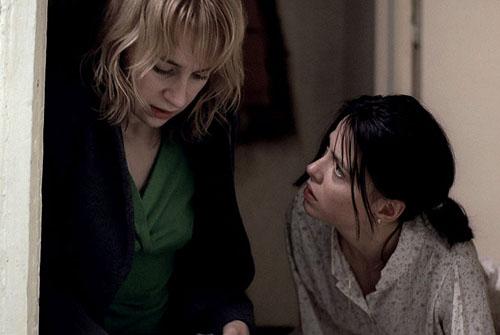Director: Cristian Mungiu
Starring: Anamaria Marinca, Laura Vasiliu, Vlad Ivanov
UK Release date: 11 January 2013
Certificate: 15 (113 mins)
You can smell the tobacco smoke, stale food and musty damp air in this
incredibly grim film.
Directed by Cristian Mungiu, on a tiny budget, 4 Months, 3 Weeks & 2
Days won the Palme D'Or at the Cannes
Film Festival and is the first in a planned series called Tales from a Golden
Age, about Communist-era Romania.
Set in 1987, in a shabby provincial town, it tells the true story of Gabita,
played by Laura Vasilu, a skinny little student who goes through an illegal
late abortion; and the trials of her loyal roommate Otilia, played
by Anamaria Marinca who helps her procure it.
The film is a very insightful portrayal of the relationship between the young
women. Gabita is simply petrified. She can't cope making the arrangements
and fibs about how many months pregnant she is. Otilia takes a big sisterly
role and helps negotiate the hotel room and the abortionist.
When the abortionist turns up - a terrifying, beefy, sweaty looking man
called Mr Bebe, played by Vlad Ivanov, I couldn't understand why the girls
didn't just run away. He warns Gabita of the dangers. During the Ceacescu
era thousands of Romanian women died from botched abortions. But Gabita doesn't
hesitate. The girls don't have enough money - so he demands sex from Otilia
to pay the bill. She complies. These girls are so passive!
Bebe carries out the procedure. It could take a couple of hours, he tells her,
or up to three days. "Don't move," he says leaving with the advice: "Don't
put it in the toilet - you'll block it up. Don't put it in the rubbish - the
dogs will get it. Go to the top of a tall building and put it down the rubbish
chute."
Otilia dutifully dashes off to her nagging boyfriend's house for an hour to
attend a family party. She sits calmly at the table while you can see she is
desperately anxious about her friend at the hotel.
When Otilia gets back, Gabita has miscarried. We see Otilia's face as she
looks in the bathroom and then the camera focuses on little doll-like foetus.
"Please bury it," Gabita asks her friend.
Throughout the film, both girls seem quite dopily unaware of what they are
actually doing. There is no discussion about the father or the baby. They are
just terrified of getting caught for what would be a serious criminal offence.
But I had the feeling both were absolutely traumatised. Laura Vasilu and
Anamaria Marinca both give extraordinary performances. The male characters are
also very well played although they are
so unsympathetic one wonders why the women would ever find them attractive!
The film is a shocking indictment of the moral poverty of Ceacescu's Romania;
and an awful portrayal of the relationship between men and women.
Some critics have described this film as an appeal for legal abortion. Others
say it is definitely a pro-life movie. I think people on both sides of the
argument need to see it.
At a question and answer session in London recently, actress Anamaria
Marinca said the film was trying to expose the truth about life under Ceacescu
regime and was an appeal for humanity in the wider sense.
Josephine Siedlecka






